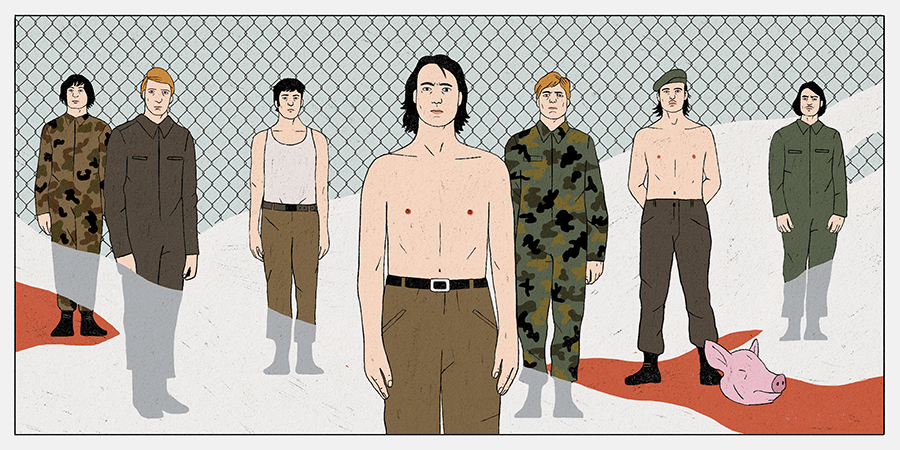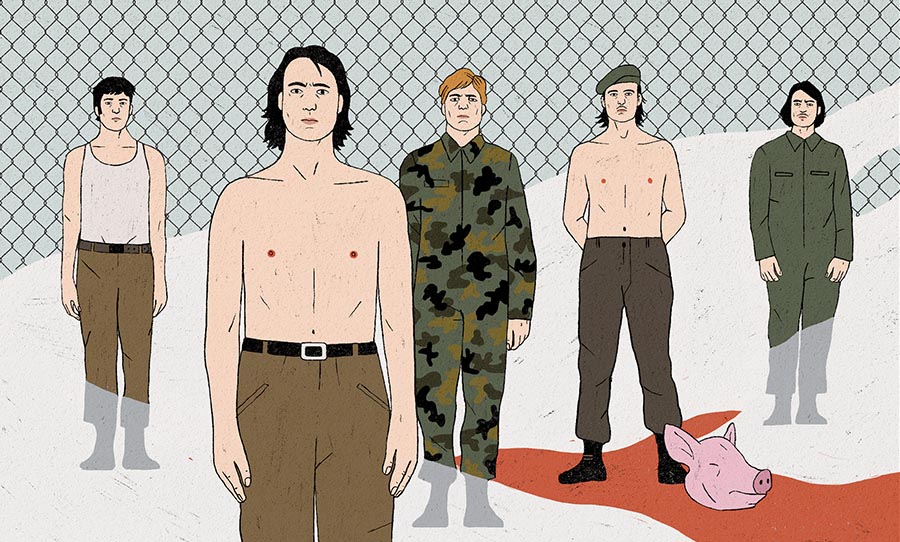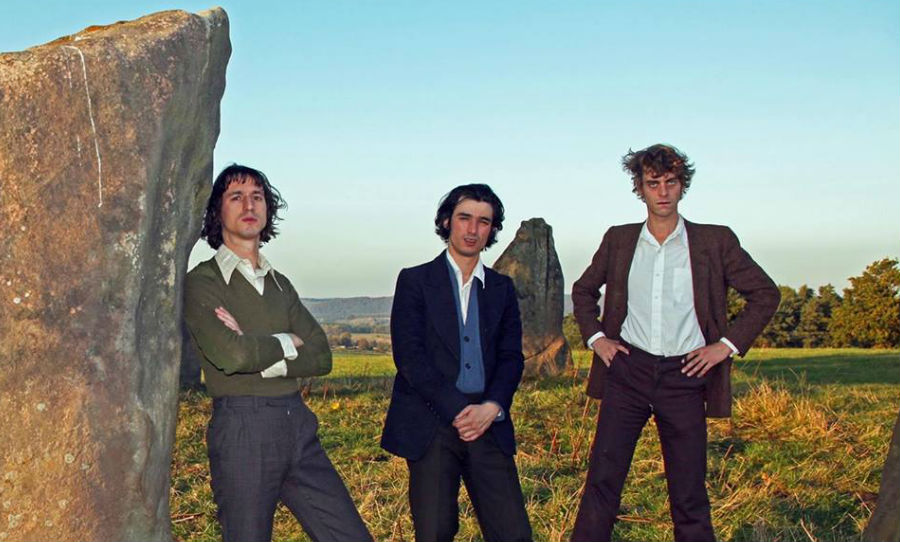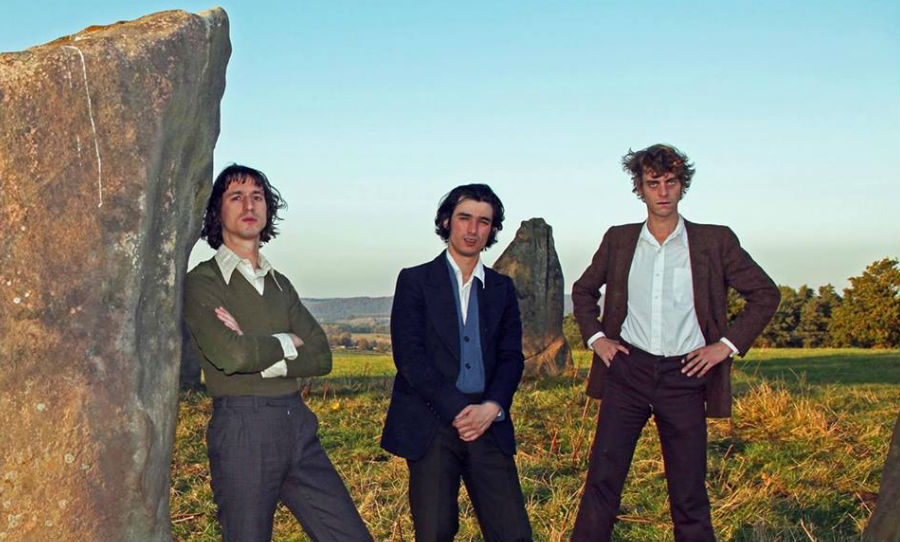Having long been plagued by infighting and drug addiction, few people expected South London’s Fat White Family to reach a third album, let alone one as bold and ambitious as Serfs Up! The new record is a startling and adventurous body of work that feels a universe removed from the dragging sludge that was Songs For Our Mothers.
So, shortly before the new album was released, we caught up with frontman Lias Saoudi to chat about their battles with smack addictions, codependent creative relationships, and how a northern pilgrimage from London to Sheffield broadened their sonic horizons.

“I genuinely believed that if we could get the band away from smack for a long enough period, we could do something that was mature and dexterous.“
HAPPY: I’ve been hearing whispers that the Fat White Family have cleaned themselves up… gotten sophisticated. Are the rumours true?
LIAS: I mean, there’s a partial truth to those rumours. The truth is that we’ve established more of a ‘heroin free zone’. We’re not exactly out of the woods though. I still expect there to be a bit of carry on with all that further down the line. I think what you see here, is a band that can finally communicate with one another in the studio because everyone’s not doing a stupid amount of hard drugs, you know? We’ve kind of made it about the music again, instead of trying to destroy ourselves for no reason.
HAPPY: I remember the last time you guys played in Sydney, it was in 2016, and Saul (Adamczewski) wasn’t playing in the band at that time. What’s gone down since then that would’ve brought him back into the fold?
LIAS: Uhh, a lack of funds? I don’t really know. You see, we did the Insecure Men album together… so after we broke up, he asked me to work on that. I worked on most of the lyrics on that album. Around that time, we discussed him coming back to do the third Fat Whites album, which we had already signed the deal for. So then, we went up north, got started on the thing, and Saul was around for that. In retrospect, I think he was always going to come back into the fold. I think we just needed to establish some sort of system. I mean, you can be a touring band and get away with a certain amount of drug use, but in the studio, you need creative communication and compromise. People slip into these weird power games and paranoias – it poisons the whole thing. So, he came back because we wanted him to come back, and he wanted to come back. We had all done our own side projects by this point, so we were all kind of aware that we could survive outside of Fat White Family. Everybody wanted to do this album, but we didn’t need to do this album.
HAPPY: You talk about establishing a system where everyone’s not abusing hard drugs… how does a system like that come about? Because establishing a system for yourself is one thing, but establishing one for a whole band is another, right?
LIAS: Yeah, it was difficult for sure. There were lots of hurdles to cross. It was an idea I’d had maybe a year or two before it occurred, but I’d been trying to push it on the band for a while. Because I really love this band. We’ve really pulled ourselves out of a hole with this band… we got to travel the world, we built a bit of credibility… so I think it was important to all of us. So I wanted us to get a bit more isolated, but not too isolated that you couldn’t come and go. Sheffield was a city that I’d started working in with my other project anyway, and it was a two-hour train ride away from London, it was really cheap so we could stay there for ages… this meant that if we relapsed, we could shut it down. But yeah, it was difficult. Some people didn’t take it too well. But I think everyone was hungry enough, and we all took some responsibility for once. It wasn’t that hard, but… I mean, Sheffield’s lovely, and it’s got a lot of lovely people… but after you’ve been living in London for so many years, like Saul and that had, it’s kind of boring. It’s really boring.
HAPPY: I remember hearing you talk on a radio program when you were in Australia last, and you described your working relationship with Saul as “codependent,” which is an idea that you explored quite thoroughly on Songs For Our Mothers. Do you still feel this way about your relationship?
LIAS: No, not really. Not in the same way. I think the most important development on this album has been that—because we thought he was gone and not coming back—I had to start writing a lot more songs and a lot more melodies. And more importantly than that, my younger brother Nathan started writing songs for the first time in his entire life. He really stepped up to the challenge. I was kind of shitting myself, but he always saw it as an opportunity. He was working really hard… he wrote the melody on Feet, and a lot of the music on Tastes Good With The Money. So he was coming up with these really great ideas, which changed the whole dynamic of the group. It meant we had a really solid writing team without Saul, and then when Saul came back, we had the best of all worlds, to a certain extent. It relieved a lot of the tension of codependency. But mainly, it was an opportunity for me and Nathan to get started on the album without him around.
HAPPY: From what we’ve heard of the album so far, there is a noticeably poppier feel to it. Was this a conscious effort you and Nathan made, to take the new album in this direction?
LIAS: Yeah, so me and Nathan were kind of the architects in the general direction of sound for this album, then Saul caught up later on. But that’s what me and my brother thought… we thought that after a sort-of heroin sludge, abrasive album like Songs For Our Mothers, we thought “how do we go the other way now? What’s the difficult thing to do now?” We didn’t know… white reggae? George Michael? That seemed like what we should do next. Obviously, we didn’t end up making anything like that. But we definitely thought some outsider pop record would be a good next move.
HAPPY: What did the rest of the band think when you brought this idea to them?
LIAS: I guess they’re all okay with it (laughs). I mean, we’ve started playing it live, and it really works. I think everyone in the group listens to pop music. We listen to all sorts of stuff… so it’s not such a huge departure for us. There are a few rock fans and guitar loyalists out there who might not be too happy, but I’m not too concerned with that. You’ve got to keep changing. That’s the thing with the third album. You see, because the first two albums are kind of intertwined… the songs are picked largely from the same pool. With the third album, you’ve been around for so long, so you’ve got to justify your continued existence. You’ve got to prove why you’re still here. So there’s a bit of pressure on the third album, but it’s a chance to do something a little more ambitious, and that’s definitely what this was for us.
HAPPY: When you’re writing and recording, is the audience reaction to your music ever a consideration?
LIAS: Only as far as a sense of context is concerned. If everyone who’s ever listened to your music thinks you’re a bunch of hopeless junky scumbags that can’t string two sentences together, then it’s nice to do something a bit more meticulous and elegant… and beautiful, I think is the word. We might surprise one or two people, but you don’t really go into with an audience in mind.
HAPPY: If you were to pin down one primary aim of releasing this new album, would it be to change this ‘junky’ perception?
LIAS: I think the primary aim of releasing this album has been survival. You know, you’ve got to feed yourselves. I just don’t think that we ever amounted to the promise of what we were early on as a band. I thought the second album was good, but I genuinely believed that if we could get the band away from smack for a long enough period, we could do something that was mature and dexterous. That’s the reason I wanted to make it. I didn’t think we’d done our best yet. That was really disappointing after all that work. I couldn’t live with that. So for me, this Northern pilgrimage was one of salvation and redemption.
HAPPY: So you definitely feel that Serfs Up! is a step up from Songs For Our Mothers? Has it felt more fulfilling?
LIAS: Yeah, for me it’s far more fulfilling. And that’s not just because I’ve done a lot more writing on this album… I think it’s a far bolder and far more adventurous piece of work. I think the references are really interesting, I think you can dance to it. To me, it’s a far more interesting record. I feel genuinely proud of what we’ve done on this one.
HAPPY: You’re currently operating as a seven-piece band… with a few old members and a few new members. Does the constantly changing state of your band ever scare you?
LIAS: Well, my model was always The Fall. I always wanted to be like The Fall. It’s kind of a band and it’s kind of a cult of personality, you know. I’d like to see myself as a classic Mark E. Smith… but I’m not nearly as mean as that guy. But in this day and age, when there’s no money in music, and there’s no security, I can’t imagine it being any other way. Plus, I think it’s really interesting getting new blood in the band all the time. New people can really fucking kill it, they can really open up a new space. So I really enjoy that aspect of the Fat White Family, to an extent. Of course, when it breaks down on the road and you’ve got to fly in a replacement guitarist, that kind of shit’s really stressful. The show must go on… that’s the bottom line basically. I like it unexpected, I like a bit of chaos.



